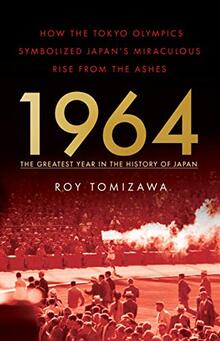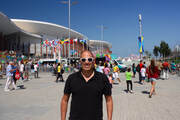That biennial encyclopedia had been a mainstay read for me and countless Olympic fact geeks, with its countless anecdotes and statistics. Although "1964" reminded me of the pain of missing Wallechinsky's works since he retired the title post-2014, it certainly brought back the joy of discovering background notes and anecdotes even for just one Games.
From insight into the exploits of famed champions like Bob Hayes, Ann Packer, Yukio Endo, Billy Mills, Dawn Fraser, and Dick Roth (who has an appendix on exhibit!) to the charms of also-rans of like Sri Lanka's multi-lapped Ranatunge Karunananda and the unique Hong Kong field hockey team, "1964" offers a satisfying array of personal connection. Where Tomizawa shines, though, is his presentation of the 1964 Games as a "coming out" for the Japanese, primed to showcase themselves and Asia after a post-World War II rebuild and imposed introspection. The passion of the host nation to impress is laid bare through its hospitality - witness long jumper Diana Yorgova's Japanese wedding - to its rise in technology as visitors are wowed by Seiko's sporting emergence and the sleek bullet trains. (Japanese cameras were certainly becoming the must-buy for visitors then!). The hosts' rapt attention to the medal efforts of its women's volleyball team, marathoner Kokichi Tsubaraya, or judoka Akio Kaminaga against Anton Geesink showcase a competitive spirit to prove themselves on the world stage.
Juxtaposed is the sense of what Tokyo 2020 might portend. While 1964 followed a post-war reconstruction, 2020's Games follow a period marked by recession, earthquakes, and tsunamis, and a fall behind China in Asian prominence. Published in July 2019 before the Games' postponement, "1964" still is a relevant pre-cursor to those interested in the to-be, hoped-for grandeur of Tokyo 2020.
p.s. Find more of Tomizawa's work on his own Olympic blog, theolympians.co. There, he includes a treasure trove of images of action and ephemera, not available on at least my e-book edition. The site offers more in-depth reporting on his stories, plus additional retrospection on related personalities and events.
p.p.s. I also highly recommend Alex Kerr's "Lost Japan" from 1994, which showcases the author's intimate view of Japan and provides a wonderfully compelling perspective of the country today (er, in the 1990's) to compare against when viewing Tokyo in 2021.




 RSS Feed
RSS Feed